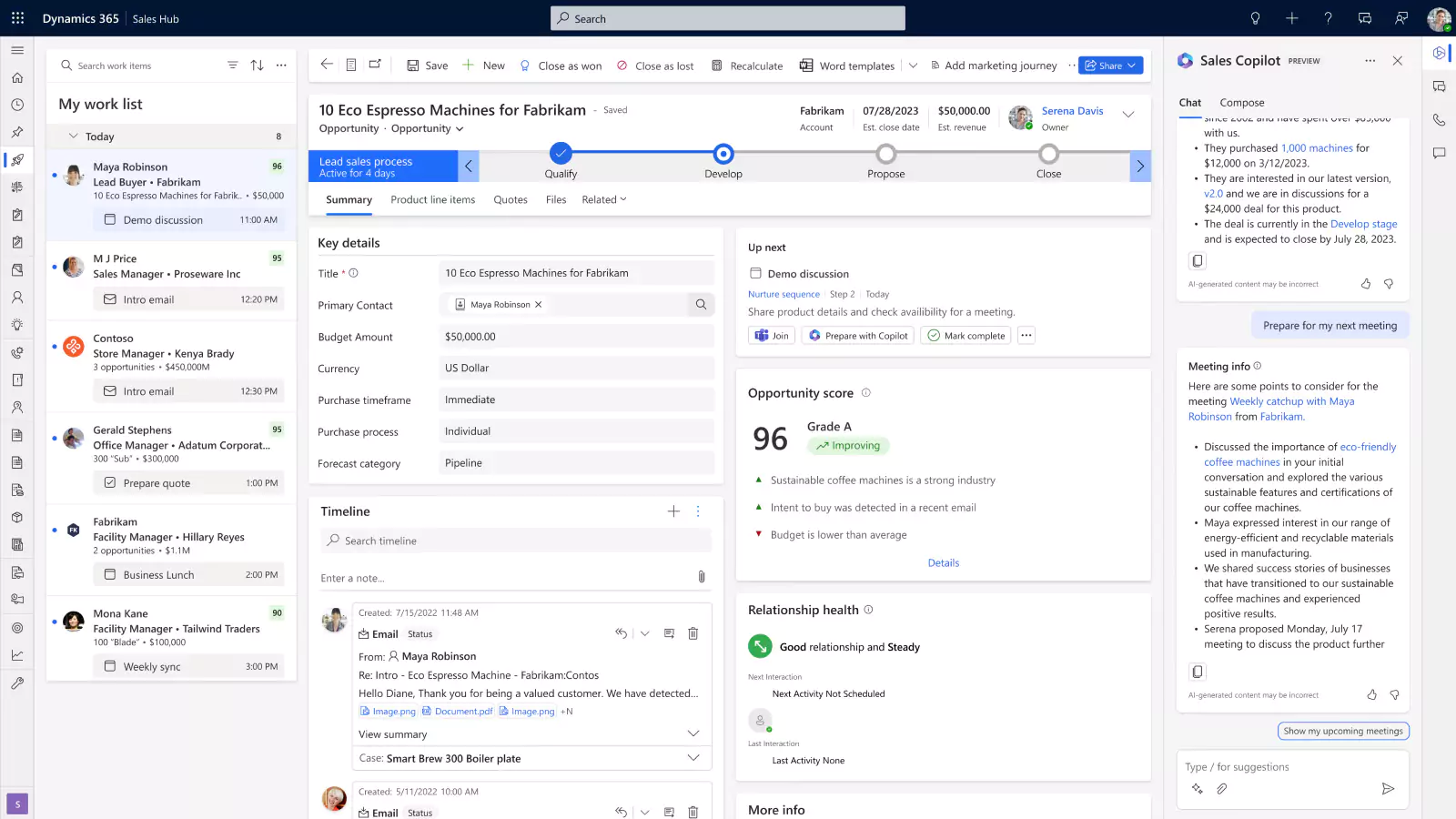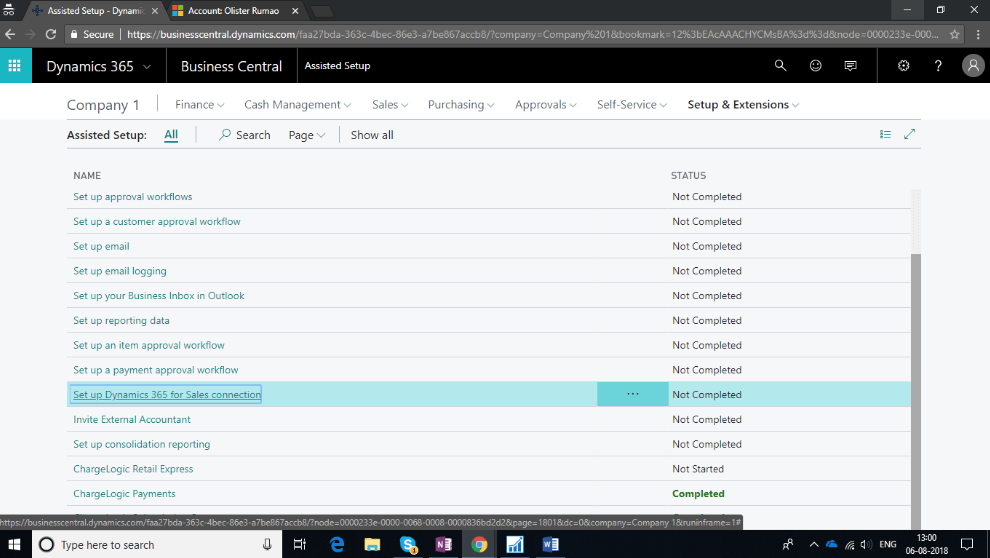Dynamics 365 Business Central vs. Dynamics 365 CRM

At first glance, Dynamics 365 Business Central (D365 BC) and Dynamics 365 CRM (D365 CRM) may appear to be overlapping solutions. After all, Business Central includes light CRM functionality, and D365 CRM offers integrations with finance and operations tools. But the reality is that Business Central and Dynamics 365 CRM serve different primary purposes. Business Central is Microsoft’s cloud-based ERP solution for small and mid-sized businesses, designed to streamline financials, supply chain, and operations. Dynamics 365 CRM, meanwhile, is not a single product but a suite of customer engagement applications, including Sales, Customer Service, Field Service, Customer Insights, and Project Operations. D365 CRM’s robust ensemble of solutions boost business processes and help growing businesses scale with ease.
In this blog, we’ll break down the differences between these two Microsoft solutions, highlight where they intersect, and explain why most businesses need to think of them as complementary tools, not competitors.
- What is D365 Business Central?
- What is D365 CRM?
- Key differences
- Business Central benefits
- Dynamics 365 Sales benefits
- Do I need D365 CRM if Business Central includes CRM capabilities?
- Pricing differences and structure
- Integrate Dynamics 365 CRM with Business Central
- Partner with Rand Group for D365 optimization
What is Dynamics 365 Business Central?
Dynamics 365 Business Central is Microsoft’s comprehensive ERP (Enterprise Resource Planning) solution for small and medium-sized organizations. It centralizes core business processes into one cloud-based platform, serving as a single source of truth for financial, operational, and customer data.
ERP Functionality
- Financial management – General ledger, accounts payable/receivable, cash flow, and financial reporting.
- Supply chain and inventory – Inventory visibility, warehouse management, vendor relationships, and procurement.
- Project management – Job costing, resource allocation, and project tracking.
- Operations management – Manufacturing, distribution, and service order management.
- Service management – Track service requests, contracts, and service orders to serve and bill customers.
- Comprehensive reporting and analytics – Built-in dashboards and Power BI integration for real-time visibility into performance across departments.
- Automation and workflow management – Automates key processes such as approvals, purchase orders, and invoicing to improve efficiency.
Business Central is primarily an ERP system but it also has some Customer Relationship Management (CRM) functionality.
CRM Functionality
- Customer management – Store customer records and track interactions.
- Sales process tracking – Manage opportunities, create quotes, and convert them into orders and invoices.
- Campaign tracking – Set up and manage simple marketing campaigns tied to contacts and opportunities.
- Customer segmentation – Group contacts and accounts to support targeted campaigns.
- Integration with Outlook – Synchronize contacts, tasks, and email interactions to keep marketing and sales efforts aligned.
Unlike starter systems like QuickBooks, Business Central consolidates all these capabilities into one solution. While it does include CRM and marketing functionality, these tools are designed for businesses with basic sales and marketing needs or companies without a dedicated sales team. Organizations that need more advanced CRM or marketing tools can combine Business Central with other Dynamics 365 CRM applications for a more robust solution.
What is Dynamics 365 CRM?
Unlike Business Central, Dynamics 365 CRM isn’t a single application. It’s a suite of Microsoft cloud applications designed to improve customer engagement and relationship management across the full lifecycle. The key applications under the CRM umbrella include:
- Dynamics 365 Sales – Helps sales teams manage leads, track opportunities, forecast revenue, and close deals faster.
- Dynamics 365 Customer Service – Provides case management, omnichannel support, and customer knowledge bases.
- Dynamics 365 Field Service – Optimizes scheduling, dispatching, and on-site service delivery.
- Dynamics 365 Customer Insights – Unifies customer data into 360-degree profiles for personalization and analytics.
- Dynamics 365 Project Operations – Supports project-based service organizations with project planning, resource management, and profitability tracking.
For the purposes of this blog, the most relevant CRM application to compare with Business Central’s CRM capabilities is Dynamics 365 Sales. D365 Sales goes far beyond contact management. It empowers sales organizations with AI-driven insights, pipeline visibility, relationship analytics, forecasting tools, and tight Microsoft 365 integrations that help sellers focus on building relationships instead of updating spreadsheets.

Have more questions about D365 Business Central and D365 Sales?
Contact our Microsoft team today to access deep technical insights and schedule a custom demo. They can walk you through a live dashboard and highlight key differences between each system plus guide your next steps.
Key Differences: Business Central vs. Dynamics 365 Sales
While there is some overlap, the core purposes of these solutions are distinct. D365 BC is about managing the back office and core operations, while D365 Sales focuses on driving revenue and customer engagement.
Business Central key benefits
Dynamics 365 Business Central is most beneficial for organizations that require a comprehensive ERP solution. It is particularly valuable for finance managers and CFOs who rely on accurate, real-time financial data, as well as supply chain managers seeking visibility into inventory and logistics. Operations managers benefit from its ability to streamline processes across departments, and executives at small to mid-sized businesses appreciate its capacity to consolidate disconnected systems into one unified platform.
The advantages of Business Central extend beyond role-specific needs. By unifying financial and operational data, the system provides a single source of truth across the organization. Its cloud-based scalability ensures that businesses can grow with confidence while leveraging Microsoft’s built-in security standards. Companies also gain a streamlined order-to-cash process, basic CRM features suitable for smaller sales teams, and seamless integration with familiar Microsoft 365 applications such as Outlook, Teams, and Excel.
Dynamics 365 Sales key benefits
Dynamics 365 Sales is ideal for organizations where sales performance, customer relationships, and revenue growth are the top priorities. It serves a wide range of users across the customer engagement spectrum. Sales representatives and account executives use it to manage leads and opportunities more effectively, while sales managers rely on its accurate forecasting and pipeline tracking to guide strategy. Customer success teams benefit from having complete visibility into accounts, and marketing teams can align their campaigns with sales insights to drive stronger results.
The benefits of Dynamics 365 Sales go well beyond the basic CRM features found in Business Central. With AI-driven recommendations and conversation intelligence, sales professionals gain deeper insights into customer behavior and engagement. Sales process automation reduces administrative work, freeing teams to focus on building relationships and closing deals. Advanced pipeline visibility and predictive forecasting help leaders plan with confidence, while its integrations with Microsoft Teams and Outlook ensures that collaboration and communication remain effortless across the organization.
Do I need D365 Sales if Business Central includes CRM capabilities?
While Dynamics 365 Business Central does include CRM features, those tools are designed to cover basic sales and customer management needs. For many organizations, especially small businesses without a dedicated sales team, these built-in features may be sufficient. D365 Business Central creates convenience and efficiency for companies where sales responsibilities overlap with accounting, order processing, or customer service.
Business Central’s CRM functionality is best suited for:
- Companies without a dedicated sales team – where sales is handled by employees who also manage accounting or customer service.
- Basic contact management – storing customer and vendor details, tracking communications, and managing opportunities at a high level.
- Simple pipeline tracking – monitoring opportunities, quotes, orders, and invoices in one unified system.
- Customer and vendor history – keeping a consolidated record of interactions tied to accounts.
- Integrated view of customer data – giving smaller sales teams immediate visibility into customer balances, credit limits, and purchase history alongside sales activity.
However, as organizations grow, sales cycles become more complex, and customer engagement becomes a strategic priority, the limitations of Business Central’s light CRM become clear. Sales teams need deeper insights, predictive analytics, and process automation. That’s where Dynamics 365 Sales comes in.
Dynamics 365 Sales equips organizations with:
- Advanced forecasting and pipeline management – accurate predictions that help leaders plan for growth.
- Rich customer insights – including relationship health, buying signals, and account activity across multiple touchpoints.
- Sales automation – reducing manual data entry and streamlining lead-to-order processes.
- AI-powered tools – conversation intelligence, recommended next steps, and deal-closing guidance.
The best part? Dynamics 365 Sales integrates seamlessly with Business Central. This integration connects back-office financial and operational data with front-office sales and customer insights, giving companies a true 360-degree view of their customers. Together, the two solutions enable end-to-end visibility, streamline quote-to-cash processes, and empower sales teams with the tools they need to drive revenue growth.
Pricing differences and structure
Pricing for Business Central and Dynamics 365 Sales follows Microsoft’s subscription-based licensing model:
Dynamics 365 Business Central:
- Essentials: $70/user/month (financials, supply chain, sales, project management).
- Premium: $100/user/month (adds manufacturing and service management).
- It should be noted that Microsoft plans to increase D365 Business Central pricing in October of 2025. The Essentials license will increase to $80 a month. And the Premium license will move to $110 per month.
Dynamics 365 Sales:
- Professional: $65/user/month.
- Enterprise: $105/user/month (includes AI, forecasting, advanced analytics).
Base and Attach Licensing
Microsoft offers a base and attach licensing model, which reduces costs when users need access to multiple Dynamics 365 applications. Here’s how it works:
- A user’s first application is purchased at the base price.
- Additional Dynamics 365 applications for the same user can then be purchased at the attach price (lower cost).
For example:
- A company with Business Central Essentials as the base license can attach Sales Professional for just $20/user/month.
- With Business Central Premium as the base license, either Sales Professional or Sales Enterprise can be added for $20/user/month.
This model makes it much more cost-effective for companies to combine Business Central’s ERP capabilities with Dynamics 365 Sales’ advanced CRM functionality.
Key Takeaway
Business Central provides ERP with light CRM functionality for one price, while Dynamics 365 Sales is a dedicated solution for customer engagement. By leveraging base and attach licensing, businesses can unlock the power of both systems at a fraction of the cost.

White Paper:
The definitive guide to Dynamics Sales licensing and pricing
Dynamics 365 Sales is a robust solution designed to support organizations of any size, with pricing structured per user to ensure both affordability and scalability. This guide provides an overview of the professional and enterprise editions, including their pricing models, user types, licensing options, and more.
Integrate Dynamics 365 CRM with D365 Business Central
The real magic happens when organizations integrate Business Central with Dynamics 365 Sales. Together, they create a complete end-to-end solution. Integration can be achieved with Microsoft’s pre-built Business Central and Dynamics 365 Sales connector, ensuring smooth data synchronization without heavy customization.
Integrating the systems provides:
- Sales to cash visibility – Sales reps see product availability and pricing from Business Central, while finance sees the pipeline from CRM.
- Customer 360 – A single view of financial, operational, and sales history in one place.
- Improved collaboration – Eliminate silos between sales and back-office teams.
- Data accuracy – Avoid duplicate entry and errors across systems.
Partner with Rand Group for Dynamics 365 optimization
Choosing the right Dynamics 365 applications is just the first step. Success comes from expert implementation, optimization, and ongoing support. That’s where Rand Group comes in. We our a Microsoft Gold Partner with decades of experience in ERP and CRM implementations. By partnering with our Microsoft experts, you gain:
- Certified Dynamics 365 consultants to guide selection and deployment.
- Tailored strategies that align Microsoft solutions with your unique business goals.
- Proven integration experience with Business Central and CRM.
- Ongoing support, training, and optimization to maximize ROI.
We can ensure you’re not just implementing software, you’re creating a scalable digital foundation for growth.

Case Study
See the power of D365 Sales and Business Central in action
Sapphire Gas Solutions needed more than just a new CRM—they needed a connected system that aligned sales and finance. By replacing Salesforce with Dynamics 365 Sales and integrating it with Business Central, they eliminated manual data entry, streamlined sales processes, and created a single source of truth across departments. The result was faster onboarding, improved collaboration, and real-time visibility that empowered smarter decisions and supported rapid growth.
Next steps
When it comes to Dynamics 365 Business Central vs. Dynamics 365 CRM, it’s not really an “either/or” decision. Business Central is your ERP system, while Dynamics 365 Sales (CRM) is your customer engagement powerhouse.
Business Central offers the financial and operational backbone your business needs, with light CRM capabilities for basic sales processes. But for companies serious about accelerating growth, improving customer relationships, and scaling sales teams, Dynamics 365 Sales is the right investment. When integrated together, the two solutions deliver a truly unified platform, giving you the insight, efficiency, and agility to grow with confidence.
Partnering with Rand Group ensures your Dynamics 365 journey is smooth, strategic, and future-proof. Contact our Microsoft team today to schedule a custom demo or to discuss next steps for integrating the D365 CRM suite with your existing D365 BC platform.





